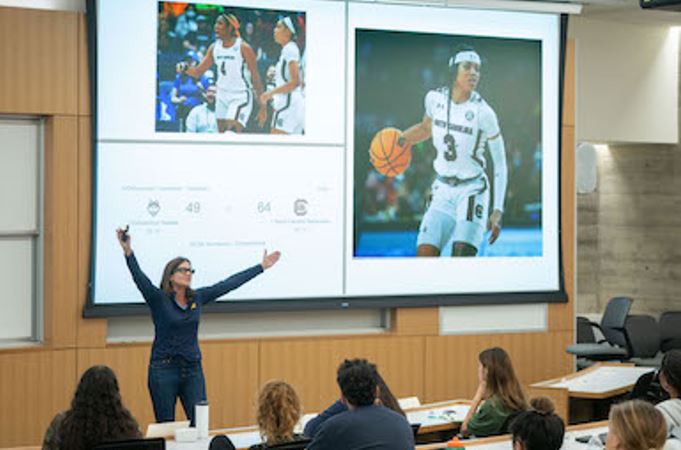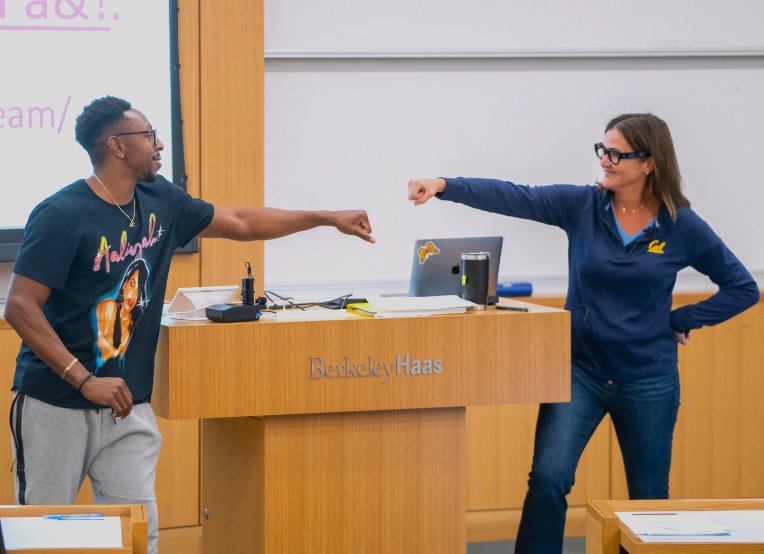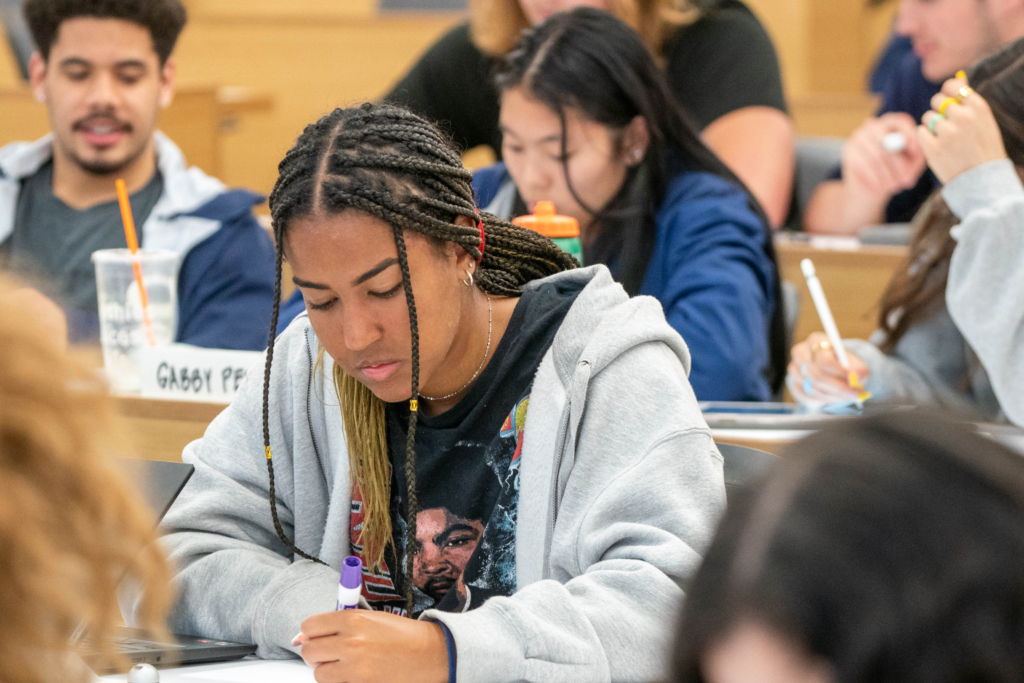
Kellie McElhaney, distinguished teaching fellow and founding director of the Center for Equity, Gender and Leadership (EGAL) at the Berkeley Haas School of Business, teaches her Equity Fluent Leadership and Personal Brand course this spring. Photo credit: Jim Block
Though she wasn’t a student athlete herself, Kellie McElhaney grew up around them. Her father was a university athletic director and often had athletes coming in and out of the house. At one time, the No. 1 female high school swimmer in the country came to her dad’s university, but the school didn’t have a women’s swimming program for her. With her sights on the Olympics, she ended up practicing with the men’s team, but didn’t compete for the school.
“It was really devastating to him. It was a huge dinner table conversation that I just absorbed,” says Kellie McElhaney, a distinguished teaching fellow and founding director of the Center for Equity, Gender and Leadership (EGAL) at the Berkeley Haas School of Business.
That experience prompted her dad to help craft the Title IX law that prohibits sex discrimination in sports and other educational activities. It also helped inform McElhaney’s work in equity leadership as well her interest working with student athletes.
Today, as the NCAA adopts a new set of rules that are fundamentally changing the business of university athletics and student athletes, McElhaney is again working at the intersection of sports and university education. This spring, she introduced a new class at Haas to help students–athletes and non-athletes alike–navigate what comes next through the lens of their own personal values and identities.
NEW POLICY FOR ATHLETES’ NAMES, IMAGES, & LIKENESSES
In 2019, the state of California was the first in the country to pass a law that allowed college athletes to benefit from their own names, images, or likenesses (NIL). It was soon followed by seven other states. In July 2021, the NCAA adopted its own NIL policy for all college athletes, allowing them to enter into sponsorships and receive cash payments and gifts.

A student brainstorms adjectives that describes them in Haas’ course, Equity Fluent Leadership and Personal Brand. Photo credit: Jim Block
At Cal, McElhaney is highly involved in both equity leadership and student athletics. She is often invited to lead leadership workshops for Cal sports teams. As Faculty Fellow for women’s swimming and women’s basketball, she helps in athlete recruitment for students who are interested in getting into Haas. Shortly after California passed its NIL law, she was named to Berkley’s NIL committee.
“I kept thinking, what a great opportunity for these kids to be very purposeful and intentional about building a brand,” McElhaney tells Poets&Quants. “This legislation is supposed to theoretically serve the student athlete, but what I am witnessing, as I’m watching this rollout, is that student athletes now have a lot more sharks swimming around them and trying to make money. You’ve got a cottage industry of agents and others swarming around the students and making big promises. I wanted student athletes to go into these relationships with an educated mind.”
She offered her course, Equity Fluent Leadership and Personal Brand, for the first time this spring. Her 48 students were a mix of athletes and non-athletes as well Haas and non-Haas students. McElhaney tells Poest&Quants that it was the first course in which Haas’ dean asked her to preserve some slots for students who weren’t enrolled in the business school.
“That’s a really big deal. A couple of my students applied to Haas, but didn’t get in so they’re really psyched to have a Haas class,” she says.
DEFINING CORE VALUES AND IDENTITIES
McElhaney taught the class with graduate student instructor André Chapman, Jr., a former UCLA 400-meter hurdler who aspired to the 2020 Olympics. In a nutshell, the course guides students into defining their personal brands through a journey of self discovery. Throughout the course, McElhaney and Chapman led students through exercises to identify their core values. Not values the values of their parents or coaches, necessarily, but the values that define them as young adults stepping out into the world. One of her students, a Cal football player, revealed his core value to be optimism, and that he wanted his work and potential affiliations to bring happiness to people.

Kellie McElhaney, at right, taught the class with graduate student instructor André Chapman, Jr., a former UCLA 400-meter hurdler. Photo credit: Jim Blcok
Students then drill down to define five key groups with which they identify. “It’s very open ended. I just help them ask questions about who they are and who they might like to partner with. It is a lot of self reflection,” McElhaney says.
Take Jazlen Green, BA ‘22, a women’s basketball player at CAL. In identifying herself in Haas news story about the class, she says: “I am an athlete, a student, a Black female, and a creator.”
From that framework, students then build their personal brands with this question in mind: “What is my brand going to stand for?” The course also centered discussion around the power of allyship and their own brands of leadership. Brand and social media influencers were invited as guest speakers to talk about identity and values in their work.
“We live in an age where people or businesses can claim certain values but their actions don’t truly line up with them. Building a sincere personal brand means holding yourself accountable by the values you claim to live and market yourself by,” says Priscilla Mendoza, a Class of 2022 Haas senior who just completed the course.
“I admire honesty, accountability, and believe people and businesses should hold themselves to these standards when building any brand in order to be equity fluent leaders,” Mendoza says.
‘LEARNING FROM ONE ANOTHER’S SHARED EXPERIENCE’

Garret Nielsen, BS ’22
Garret Nielsen, a Haas student and Cal baseball player, is not interested in personally benefiting from the NIL policy, but wants to help develop aspiring baseball athletes.
“I would have been ecstatic if a college player had helped me with my game when I was a kid,” Nielsen tells Haas. “I now have the opportunity to do just that. I think that’s the true gift of being a Cal athlete.”
Equity Fluent Leadership & Personal Brand forces students to ask the hard questions, Nielsen says. “The most important lesson that this class has taught me is you have to establish a foundation of who you are before success comes.”
Mendoza, who is not a student athlete, heard about the class through her work with McElhaney in EGAL. As a first-generation Latina, Mendoza understood the importance of DEI, but she wanted to learn the skills an equity fluent leader might possess and apply to the business world.
“This class brought together athletes and non-athlete students, and it was beautiful learning from one another’s lived experiences. We talked about uncomfortable topics and how to deal with them,” she tells Poets&Quants. “We would share personal solutions and opinions on DEI topics and it was an amazing experience to feel heard. This was truly one of the most engaging and exciting classes I have ever taken at Cal.”
A BRAND FOR WHAT COMES NEXT

Students in Equity Fluent Leadership and Personal Brand. Photo credit: Jim Block
For their last assignment, students wrote up their brand pitches along with several social media post mock-ups. For example, as a football player with a core value of optimism, build five Instagram posts as someone who wants to bring positivity to the world.
In future iterations, McElhaney would like to explore topics such as contract law, money management, and brand partnership from the companies’ perspectives. She hopes these kinds of lessons can be developed and expanded to reach more of Cal’s 800 or so student athletes.
“Student athletes don’t have a lot of opportunities to get leadership training, and that’s just really fundamental,” she says.
Whatever comes next–partnering with companies, continuing athletic careers, or finding their first jobs–a solid personal brand will help them make decisions that align with their values and identities.
DON’T MISS: AFTER COVID RESTRICTIONS, TWO CUTTING-EDGE VILLANOVA LABS GET A REBOOT AND HOW MUCH IS YOUR SMALL BUSINESS WORTH? THESE NYU STUDENTS WILL TELL YOU











Questions about this article? Email us or leave a comment below.